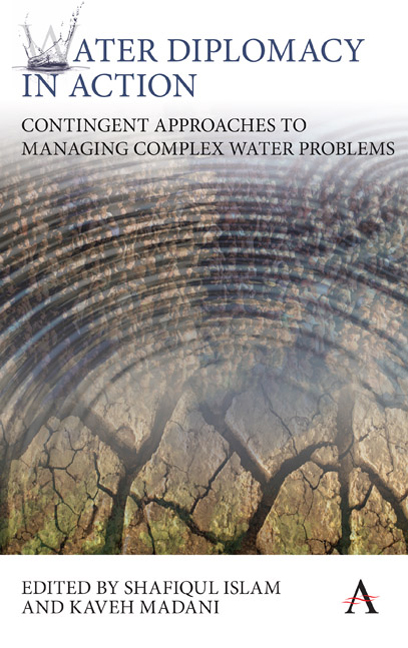Book contents
- Frontmatter
- Contents
- List of Figures
- List of Tables
- The Blind Men, the Elephant and the Well: A Parable for Complexity and Contingency
- Preface
- Part I ROOTS AND CAUSES OF COMPLEXITY AND CONTINGENCY IN WATER PROBLEMS
- Part II TOOLS, TECHNIQUES, MODELS AND ANALYSES TO RESOLVE COMPLEX WATER PROBLEMS
- Chapter Three Ten Bankruptcy Methods for Resolving Natural Resource Allocation Conflicts
- Chapter Four Flexible Design of Water Infrastructure Systems
- Chapter Five Extreme Value Analysis for Modeling Nonstationary Hydrologic Change
- Chapter Six The Water– Food Nexus and Virtual Water Trade
- Chapter Seven A Hybrid Analytical Approach for Modeling the Dynamics of Interactions for Complex Water Problems
- Chapter Eight A Call for Capacity Development for Improved Water Diplomacy
- Chapter Nine Water Complexity and Physics- Guided Data Mining
- Part III CASE STUDIES
- Notes on Contributors
- Index
Chapter Nine - Water Complexity and Physics- Guided Data Mining
from Part II - TOOLS, TECHNIQUES, MODELS AND ANALYSES TO RESOLVE COMPLEX WATER PROBLEMS
Published online by Cambridge University Press: 10 January 2018
- Frontmatter
- Contents
- List of Figures
- List of Tables
- The Blind Men, the Elephant and the Well: A Parable for Complexity and Contingency
- Preface
- Part I ROOTS AND CAUSES OF COMPLEXITY AND CONTINGENCY IN WATER PROBLEMS
- Part II TOOLS, TECHNIQUES, MODELS AND ANALYSES TO RESOLVE COMPLEX WATER PROBLEMS
- Chapter Three Ten Bankruptcy Methods for Resolving Natural Resource Allocation Conflicts
- Chapter Four Flexible Design of Water Infrastructure Systems
- Chapter Five Extreme Value Analysis for Modeling Nonstationary Hydrologic Change
- Chapter Six The Water– Food Nexus and Virtual Water Trade
- Chapter Seven A Hybrid Analytical Approach for Modeling the Dynamics of Interactions for Complex Water Problems
- Chapter Eight A Call for Capacity Development for Improved Water Diplomacy
- Chapter Nine Water Complexity and Physics- Guided Data Mining
- Part III CASE STUDIES
- Notes on Contributors
- Index
Summary
Abstract
Climate projections, especially at decadal to century scales, rely on physics- based computer models. While the models have generated useful information about global warming and hydrology, “the sad truth of climate science is that the most crucial information is the least credible” (Schiermeier 2010). The possible reasons include intrinsic variability of the climate system as well as our lack of understanding of the physics and the inability to include known physics within the current generation of computer models. Data sciences, ranging from statistics and signal processing to machine learning and nonlinear dynamics, continue to help fill some of the crucial gaps in climate. We hypothesize that these data science solutions can be improved if they are driven by physical knowledge, especially when this knowledge cannot be incorporated in current climate models because they are incomplete or incompatible. We have called this paradigm Physics-Guided Data Mining (PGDM) (Ganguly et al. 2014). In addition to motivating and introducing PGDM, this chapter presents three case studies on precipitation, based on our prior work. Statistical downscaling, which generates higher- resolution projections from lower- resolution model simulations, benefits from a blend of sparse learning techniques with physically motivated covariates (Das et al. 2014; 2015). Multimodal uncertainty quantification shows the potential to improve when physical relations with ancillary variables are considered together with historical skills and future consensus, within a Bayesian framework (Ganguly et al. 2013; Kodra 2014a; Smith et al. 2009). Characterization of internal variability and associated model performance benefit from data- driven analysis of multi- initial condition ensembles, combined with physical understanding of oceanic indices and their initializations (Kodra et al. 2012). The proposed PGDM paradigm, illustrated through our prior publications, shows the potential to bridge crucial knowledge gaps in climate science and help in translation to water resources impacts.
The Grand Water Challenge
Our planet and society continue to be critically shaped by water. In the 21st century and beyond, water is without question among the major clear and present challenges facing the world (Hall et al. 2014). Water in the atmospheric column is perhaps the most important of all the greenhouse gases and causes the most significant uncertainties in our understanding and projections of climate variability and change. Water in the oceans is critical for the survival of the majority of species while water towers in glaciers sustain riverine systems.
- Type
- Chapter
- Information
- Water Diplomacy in ActionContingent Approaches to Managing Complex Water Problems, pp. 155 - 178Publisher: Anthem PressPrint publication year: 2017



